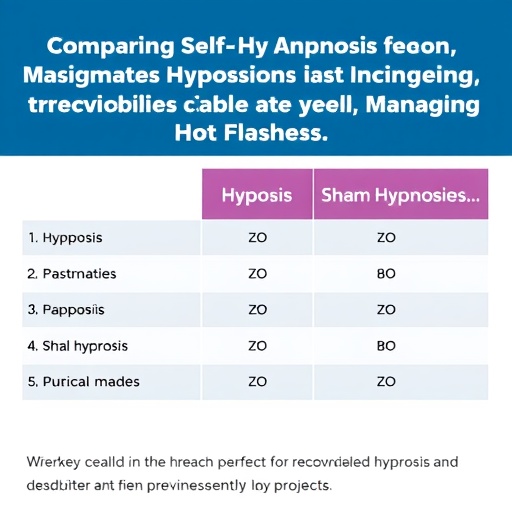A recently published randomized clinical trial in JAMA Network Open has unveiled groundbreaking findings on the effectiveness of clinical hypnosis in managing hot flashes among postmenopausal women. This research illuminates a non-pharmacological intervention that significantly reduces both the frequency and severity of hot flashes, a debilitating symptom that affects the quality of life in millions globally. The study’s novel approach utilized self-administered audio files to deliver hypnosis, marking a pivotal shift towards accessible and scalable treatment options in menopausal health care.
Hot flashes, characterized by sudden sensations of heat often accompanied by sweating and flushing, commonly affect women during the menopausal transition due to hormonal changes, primarily estrogen withdrawal. These vasomotor symptoms not only cause physical discomfort but also disrupt sleep, mood, and daily activities, exacerbating the overall menopausal experience. Traditional treatments have included hormone replacement therapy and alternative supplements, both carrying varying degrees of risk and efficacy. The emergence of a hypnotic intervention offers a promising paradigm that circumvents pharmacological side effects.
In this rigorous clinical trial, participants were randomly assigned to either a clinical hypnosis group or an active control condition. The intervention group engaged with hypnosis sessions delivered through carefully designed self-administered audio files over a six-week period. This methodology capitalized on the advantages of hypnotic suggestion to modulate central nervous system pathways implicated in symptom perception and regulation, providing a mechanistic basis for observed therapeutic outcomes.
Quantitative results revealed that women in the hypnosis cohort experienced statistically significant reductions in hot flash frequency and intensity, measured through validated hot flash scores. Additionally, these reductions translated into decreased reported interference of hot flashes on daily functioning, underscoring the clinical relevance beyond mere symptom mitigation. The effect size and clinical significance were robust, suggesting hypnosis as a credible and effective treatment modality.
The use of audio-delivered hypnosis introduces an innovative, low-cost, and easily accessible intervention. This delivery mode mitigates common barriers encountered with traditional face-to-face hypnotherapy, such as limited availability of trained practitioners and logistical challenges. The self-administered format empowers patients with autonomy over their care, a critical factor in chronic symptom management and adherence. It also aligns well with digital health trends aiming to expand reach through telemedicine and mobile health solutions.
From a neuroscientific perspective, hypnosis engages altered states of consciousness that facilitate focused attention, heightened suggestibility, and deep relaxation. These states are hypothesized to influence autonomic nervous system regulation, potentially dampening the hyperactive thermoregulatory responses that precipitate hot flashes. Furthermore, hypnosis may alter cognitive appraisal and emotional response to somatic symptoms, reducing distress and improving quality of life.
The trial’s randomized controlled design ensures methodological rigor, reducing biases and enhancing the reliability of findings. Randomization balanced confounding variables, and the inclusion of an active control group controlled for placebo and expectancy effects, isolating the specific influence of hypnosis. Such stringent study design strengthens the argument for hypnosis’s efficacy as a stand-alone intervention rather than a non-specific therapeutic effect.
Importantly, the research highlights safety and tolerability, with no adverse events reported related to hypnosis. This positions the modality as a potentially preferable option for women contraindicated for hormone therapy or those seeking complementary strategies. It also opens avenues for integrating hypnosis into multidisciplinary menopause care frameworks, supporting holistic approaches to symptom management.
The implications of these findings extend beyond menopausal symptomatology. Demonstrating effective symptom control through hypnosis could invigorate interest in exploring its applications across other clinical domains characterized by dysregulated autonomic activity or psychosomatic interplay. This innovation reinforces the value of mind-body interventions in modern medicine, bridging psychological science and physiological health.
Given the large population of aging women worldwide and the substantial burden of menopause-related symptoms on healthcare systems and individual well-being, scalable treatments such as audio hypnosis possess significant public health relevance. Future research is warranted to optimize treatment protocols, explore long-term efficacy, and investigate neural correlates via neuroimaging to deepen understanding of hypnotic mechanisms in symptom alleviation.
To facilitate widespread adoption, dissemination efforts must include education of healthcare providers about the benefits and implementation of audio hypnosis. Integrating such interventions into digital platforms with user-friendly interfaces could enhance patient engagement and real-world effectiveness, contributing to broadening health equity in menopausal care access.
In summary, this clinical trial offers compelling evidence that self-administered audio hypnosis is a clinically meaningful, effective, and safe method to substantially reduce hot flashes in postmenopausal women. The innovative approach leverages psychological and physiological mechanisms to address a pervasive symptom, representing a significant advancement in women’s health. As our understanding of mind-body interactions evolves, hypnosis stands out as a promising therapeutic tool deserving prominent consideration in clinical practice.
Subject of Research: Clinical hypnosis for reduction of hot flashes in postmenopausal women
Article Title: [Not provided in the source content]
News Publication Date: [Not provided in the source content]
Web References: doi:10.1001/jamanetworkopen.2025.42537
References: [Not provided in the source content]
Image Credits: [Not provided in the source content]
Keywords: Hypnosis, Menopause, Symptomatology, Sound recording, Women’s studies, Clinical trials, Randomization




